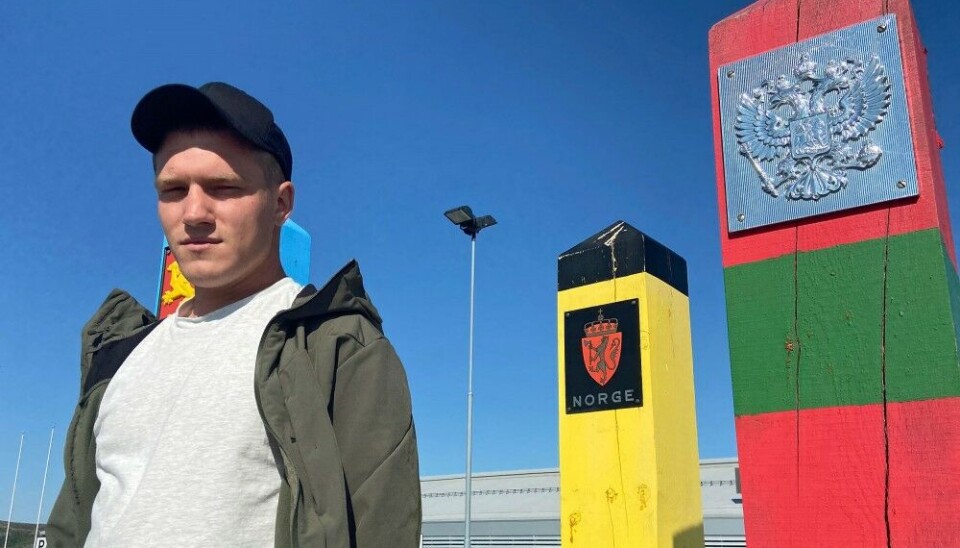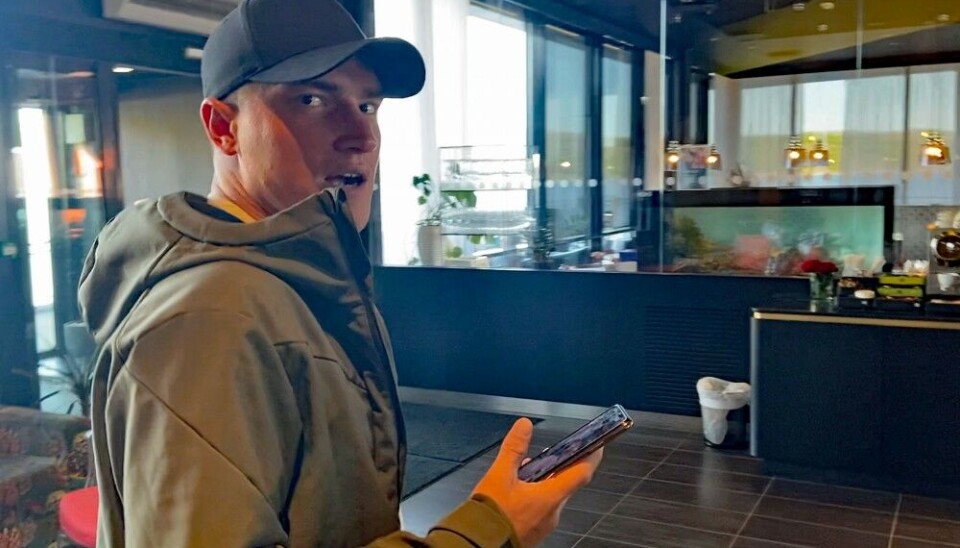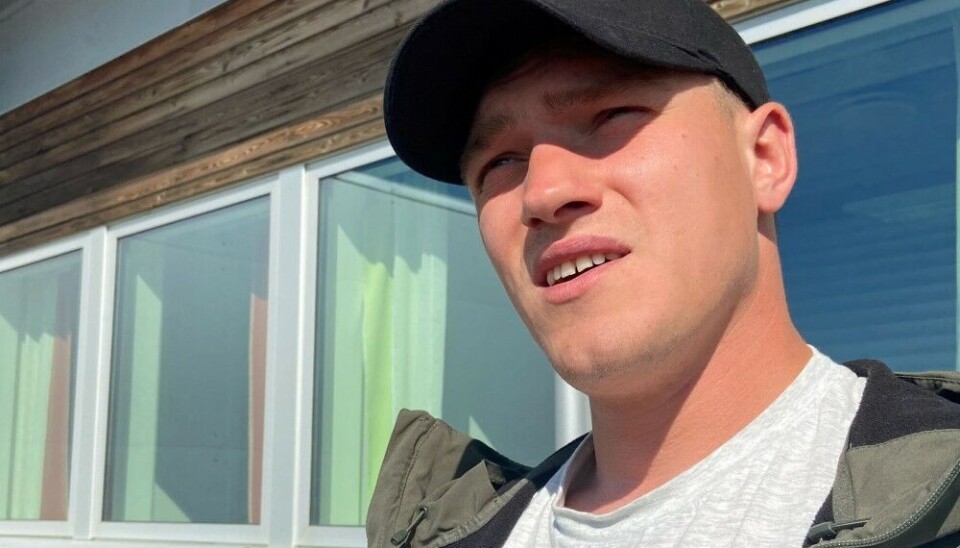
Asylum-seeking Wagner defector back in borderland
No war crimes against civilians, Andrei Medvedev claims: “No Wagner fighters allowed themselves to do something illegal. If this had happened, this man would be shot right on the spot.”
He was one of them. One of the tens of thousands of paramilitary troopers that signed up to fight Russia’s bloody illegal war on Ukraine. Many of the remaining in the Wagner Private Military Corporation (PMC) now want him dead.
“You will die soon, negotiations are already underway to extradite you.”
Andrei Medvedev tells the Barents Observer about the latest of many messages he has got from fellow Wagner fighters home in Russia.
The contrasts couldn’t be starker. When Medvedev in mid-January fled across the icy Pasvik River in snowdrift and polar night he had barking dogs behind. He said shots were fired by FSB border guards. Today, half a year later, the Wager deserter came back north to Kirkenes next to the Norwegian-Russian border under a warm midnight sun with stunning 23°C.
Medvedev seeks asylum in Norway because he fears for his life. Running from the battlefields in Ukraine, he was a key witness to the torture and killing of Russian mercenaries, ex-prisoners recruited to fight for Wagner boss Yevgeny Prigozhin.
He says he is ready to testify in court about what he saw when he fought in Bakhmut, the gruesome frontline in eastern Ukraine.
His escape to Norway made worldwide headlines as he is believed to be the first member of the paramilitary group to defect to the West.
The 27-year-old mercenary fled north and managed to enter the heavily guarded border zone on the Kola Peninsula. Here, he jumped out of the car, climbed the barbed wire fence and ran in deep snow a few hundred meters to safety. Norwegian military border guards detained him and brought him to the police station in Kirkenes from where he later the same day was taken to Oslo.
In Oslo, Andrei continued to make headlines. In February, he was arrested for violence against police who brought him in for fighting outside a bar and carrying a soft gun. A month later, he was detained in Sweden where he went to buy cheaper cigarettes. As an asylum seeker in Norway, he is not allowed to leave the country while his application is being processed.
For Norway, Medvedev represents a dilemma. Grant him asylum because he faces severe, maybe deadly, revenge home in Russia, or hand him over to Ukrainian prosecutors to stand accountable for his active participation in the illegal war of aggression.
In May, he announced in a YouTube video his desire to return to Russia. According to what Medvedev then said, the Russian Embassy in Oslo should help him with traveling home.
His journey to Kirkenes this week was supposed to go undercover. “How did you find me,” is his first response when approached by the Barents Observer at one of the local hotels Friday morning.

Andrei is unwilling to detail the exact scoop of his visit to the Russian-Norwegian borderland.
“I saw off my acquaintances, close friends,” he says without elaborating on identity. Kirkenes is a 15-minute drive from the checkpoint on the road heading into the Murmansk region. Norway’s border with Russia is currently the only land border to Schengen Europe where Russians holding tourist visas can enter.
He assures that he has no plans, whatsoever, to return to Russia. “It’s just a bunch of misunderstandings going on around me.”
Medvedev admits he is afraid of being sent to Ukraine.
“I feel ambivalent in Norway. Some things are easier, some are harder. Friends, acquaintances, relatives - all in Russia. But I like the country - beautiful, calm,” he says when talking to the Barents Observer on the shores of the Bøkfjord, an arm of the larger Varanger fjord where Norway and Russia in 2010 announced they had reached an agreement on the maritime border delimitation. Today, relations between the two countries are as cold as the day when Andrei Medvedev crossed the river forming Russia’s northernmost land border with Schengen Europe.
Do you receive threats from the Wagnerites?
“A lot,” Andrei says with a thoughtful face.
“The last message was - “You will die soon - Negotiations are already underway to extradite you.” They know my call sign, mention my commanders and people who served with me.
Medvedev says he takes the threats seriously.
“Life is generally dangerous.”
“Let’s remember how it all happened. Many convicts were thrown into the Wagner group, the strength of the Wagner grew It was difficult for the Ukrainian military to defend its territory. But when I arrived here [to Norway], began to testify and speak publicly, Prigozhin’s oxygen was cut off. If I had not appeared here, Wagner would have grown in power and strength, arms supplies, and so on. I came to help; I made it clear to many who were going to join Wagner PMC what was happening,” Andrei Medvedev states.
Medvedev explains how he has seen Yevgeny Prigozhin’s brutality.
“Of course, I saw him perform in front of corpses. Well, let’s start with the fact that it’s all because of you, Uncle [Prigozhin], you sent them there. Put him in power, he will beat people in the head with a sledgehammer in the squares for misconduct.”
“I grew up in an orphanage, and then there is patriotism. A young mind, youthful maximalism… Nothing is born immediately by a scientist, the worldview is formed over time. People who say that we need to fight against Ukraine simply do not understand what is happening.”
Andrei lights his fifth cigarette during the interview.
“I believe that people on both sides should just open their eyes,” …. “Actually, the Ukrainians are defending themselves. Russian troops are on Ukrainian territory.”
Medvedev says he openly talks with police officials in Norway who are investigating war crimes in Ukraine.
“With regard to crimes, against prisoners of war and their [Russia’s] own people, the principles of humanity do not apply. I’m talking to the police about this.”

He downplays his own role on the battlefields.
“I didn’t commit any crimes. I was a simple squad leader who followed orders.”
According to Medvedev, his Wagner squad didn’t violated the rules of war when it came to civilians.
“I’m not going to lie or invent anything. As long as I was in Ukraine, I did not see any of the Wagner fighters allowing themselves to do something illegal to the civilian population,” Andrei Medvedev says.
Then he adds: “If this had happened, that man would have been shot right on the spot.”
















